Behind the revelry, Trump's crypto-friendly stance during the campaign period is indispensable. He explicitly promised that if elected, he would strongly support the development of the crypto industry, stating that he would turn the US into the "global capital of cryptocurrencies", announced the establishment of a "Bitcoin strategic reserve", and also revealed the crypto platform - World Liberty Financial (WLFI) - supported by his family.
Just a few days before Trump took office, a Memecoin called "Trump" emerged, quickly attracting market frenzy under the title of the US President, and also attracted a large number of new investors through the "breaking circle" effect, pushing the crypto industry's enthusiasm to a new high. On January 20, Trump was officially sworn in. At the same time, the crypto-friendly officials he nominated also took office one after another. Among them, on January 23, Republican Senator Cynthia Lummis, who proposed the "Bitcoin Bill", was appointed as the chairman of the Senate Banking Digital Assets Subcommittee. CZ said, "The Bitcoin reserve is basically determined." In addition to Lummis, what other heavyweight figures are in this "crypto dream team" as dubbed by the outside world? How will they affect the future of the crypto industry? Let's take a closer look. 01 Crypto-Friendly SEC Chair As is well known, the SEC has had a long-standing feud with crypto. As a regulatory agency under the US government responsible for overseeing the stock market, with the purpose of maintaining the transparency of transactions, cracking down on fraudulent schemes, and protecting investors' confidence in the stock market, the SEC has formulated securities registration rules and oversees their implementation.
The SEC's regulation of the crypto industry can be traced back to 2013, and as the crypto industry has grown, the regulatory intensity has also increased. In recent years, all major regulatory initiatives in the industry have been related to the SEC, including the Ripple lawsuit, the FTX collapse, and the BN fine incident. On the second day of his inauguration, the same day that former SEC Chair Gary Gensler stepped down, Trump announced that Republican SEC Commissioner Mark T. Uyeda would serve as the acting chair until Paul Atkins (Trump's official nominee to replace Gensler) completes the Senate confirmation process. On the same day, Mark announced the establishment of a Crypto Assets Working Group to develop a clear and concise US regulatory framework for crypto assets.
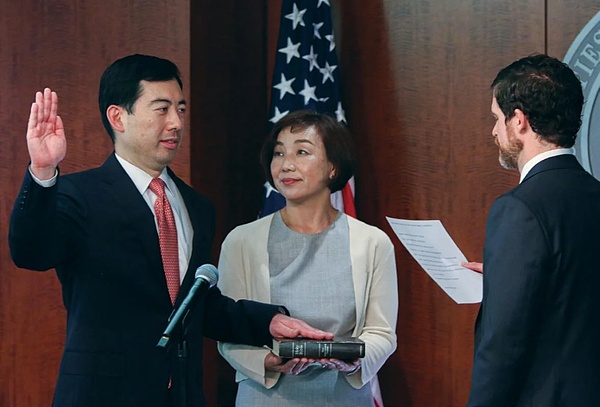 Mark Uyeda (left) being sworn in as acting SEC chair, source: YouTube
From the SEC's official statement, we can see that Mark has a rich educational background and professional experience. He has worked as a lawyer in Washington and Los Angeles, then joined the California securities regulatory agency, and held several senior positions in the Trump administration. At the SEC, he has held multiple important positions, and was finally appointed as an SEC commissioner in June 2022.
Mark Uyeda (left) being sworn in as acting SEC chair, source: YouTube
From the SEC's official statement, we can see that Mark has a rich educational background and professional experience. He has worked as a lawyer in Washington and Los Angeles, then joined the California securities regulatory agency, and held several senior positions in the Trump administration. At the SEC, he has held multiple important positions, and was finally appointed as an SEC commissioner in June 2022.Although he has been relatively low-profile in the public eye, reports indicate that he is supportive of the development of the crypto industry. In his past work, he has voted in favor of crypto-related ETF reviews, and has held similar positions to another commissioner, Peirce, advocating that the SEC should positively respond to the needs of the crypto industry and promote the development of clearer regulatory rules. Previously, on December 4, 2024, Trump nominated Paul Atkins, who served as an SEC commissioner during the George W. Bush administration (2002-2008), to be the next SEC chair.
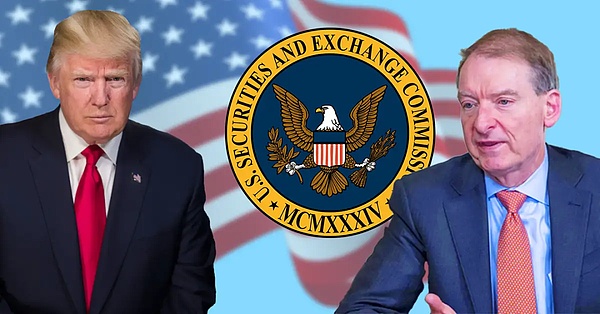 Atkins has worked on securities issuance and M&A affairs at a New York law firm, joined the US Securities and Exchange Commission (SEC) in 1990, and assisted multiple chairs in formulating important regulations in areas such as corporate governance, shareholder rights, and capital market access, with rich legal and regulatory experience.
Atkins has worked on securities issuance and M&A affairs at a New York law firm, joined the US Securities and Exchange Commission (SEC) in 1990, and assisted multiple chairs in formulating important regulations in areas such as corporate governance, shareholder rights, and capital market access, with rich legal and regulatory experience.In recent years, Atkins has been supportive of the development of the crypto asset industry. He has served as co-chair of the Token Alliance, promoting best practices for digital asset issuance and trading platforms; he has also served as an advisor to the DeFi platform Reserve Rights Foundation. In 2022, he proposed allowing 401(k) retirement funds to invest in Bitcoin, believing that this asset class deserves to be accepted by more Americans. In an early 2024 podcast, Atkins clearly expressed his view: "We are entering the era of the transformation of cryptocurrencies. As long as the government and the SEC are more inclusive and engage in direct dialogue with the industry, the future of the US market will be brighter." He emphasized that the SEC should support market innovation, reduce investor costs, and return to its core mission. In addition to his support for cryptocurrencies, Atkins has also criticized the unreasonable burden of the Dodd-Frank Act on the banking industry, advocating for reducing government intervention in the market. Ripple CEO Brad Garlinghouse expressed a positive view of Atkins' nomination, calling him "an excellent choice" and believing he will bring a new atmosphere to the SEC. Although Atkins' personal holdings of crypto assets have not been disclosed, the market generally speculates that he may hold Bitcoin or other mainstream crypto assets. Currently, Atkins' appointment is awaiting a Senate vote, which may take several months, with Mark serving as the acting chair in the meantime. Overall, Mark Uyeda's acting chair position and Paul Atkins' official nomination signal that the SEC may adopt a more accommodating and proactive regulatory attitude. Whether this change can promote a balance between the industry and policy will be closely watched. 02 Treasury Secretary Supporting Crypto The US Treasury Department, as a core federal government department, is responsible for fiscal policy, currency issuance, tax management, financial market stability, and anti-money laundering and counter-terrorism financing, while also driving research on a digital dollar and influencing the development and legalization of the crypto industry. In the US, the Treasury Secretary is considered one of the "four most important positions in the US Cabinet" second only to the Vice President. On November 22, 2024, Trump nominated billionaire Scott Bessent to serve as Treasury Secretary.
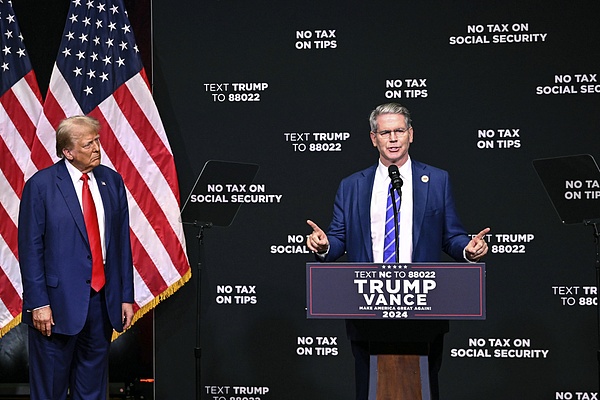 Bessent, 63 years old this year, graduated from Yale University with a degree in political science. During college, he delved into macroeconomics and financial instruments, and quickly rose to prominence after graduation, serving as Chief Investment Officer of Soros Fund Management, with rich experience in market trading and economic policy consulting.
Bessent, 63 years old this year, graduated from Yale University with a degree in political science. During college, he delved into macroeconomics and financial instruments, and quickly rose to prominence after graduation, serving as Chief Investment Officer of Soros Fund Management, with rich experience in market trading and economic policy consulting.As a financial expert who openly supports cryptocurrencies, Bessent has repeatedly referred to cryptocurrencies as "an indispensable part of the financial future". In an interview with Fox Business Channel in early 2024, he stated: "Cryptocurrencies represent freedom, and the crypto economy will continue to exist." He particularly emphasized that the most attractive aspect of Bitcoin is that it attracts young people and those who have not previously participated in the market. He believes that cultivating market culture and establishing a more suitable system for the masses is the core of capitalist development. Trump had previously praised Bessent on the Truth Social platform, calling him "one of the most outstanding international investors and strategists in the world", and stated that Bessent's successful experience perfectly embodies the "American Dream". Trump also mentioned that on the 250th anniversary of the founding of the United States, he will work with Bessent to consolidate America's position as the global center of economics, innovation, and capital, while ensuring that the US dollar continues to be the global reserve currency. As an important ally of Trump on Wall Street, Bessent not only provided economic support for his campaign, but also provided key advice for policy formulation. However, Bessent's nomination has elicited mixed reactions in the industry. Ripple CEO Brad Garlinghouse called it a "victory for innovation" and believes that Bessent's addition will drive crypto-friendly policies. In contrast, Elon Musk expressed disappointment with the nomination, criticizing Bessent as a "business as usual" choice, and warned that this mindset is leading the US towards bankruptcy.
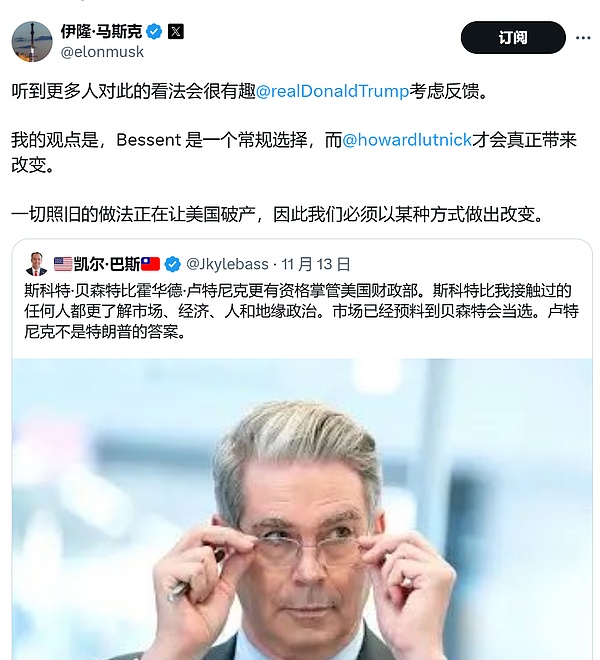
According to news on January 22, Senate Finance Committee Chairman Mike Crapo currently stated that he hopes the Senate will hold a full confirmation vote on President Donald Trump's nominee for Treasury Secretary, Scott Besent, next week.
03 BTC Max's Commerce Secretary
The U.S. Department of Commerce is primarily responsible for promoting economic growth, increasing employment, advancing international trade and technological innovation, while also playing a critical role in strengthening the U.S. semiconductor industry and reducing dependence on Asia. Although the Department of Commerce does not directly regulate the cryptocurrency market, it can still indirectly impact the security, technological development, international trade and intellectual property protection of the cryptocurrency market through its relevant functions and policy measures.
On November 19, 2024, Trump nominated Howard Lutnick, CEO of Cantor Fitzgerald, as the new Commerce Secretary.
Lutnick is undoubtedly a staunch supporter of Bitcoin. In an interview with a CNBC podcast, he clearly stated: "I support cryptocurrencies, but only Bitcoin. The other tokens are not worth mentioning." He also specifically mentioned his support for the stablecoin Tether, and stated: "Bitcoin should trade freely like gold, and we will do our utmost to promote this goal." In 2024, his speech at the Bitcoin conference further consolidated his clear position in the cryptocurrency industry. In addition, he revealed that he personally holds a large amount of Bitcoin.
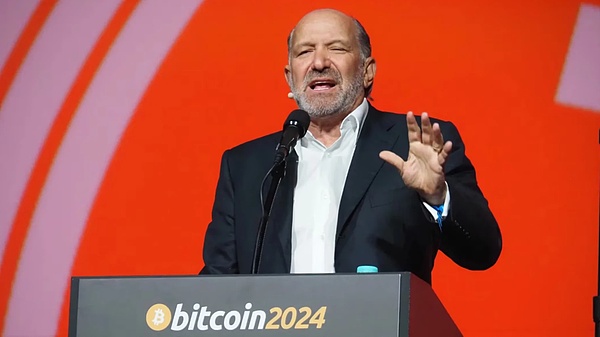
According to Coindesk, Cantor Fitzgerald not only manages Tether's reserve funds, but also participates in U.S. Treasury trading, and has announced a $2 billion Bitcoin financing business to provide leverage for Bitcoin investors.
Lutnick is also a close ally of Trump and a staunch supporter of the MAGA movement. He actively fundraised for Trump in the 2020 and 2024 presidential elections.
Previously considered a hot candidate for Treasury Secretary, however, Trump ultimately appointed Lutnick to lead the relatively smaller Department of Commerce.
After the nomination, Lutnick expressed his gratitude on social media X, stating that he will strive to achieve the goal of 'Making America Great Again'.
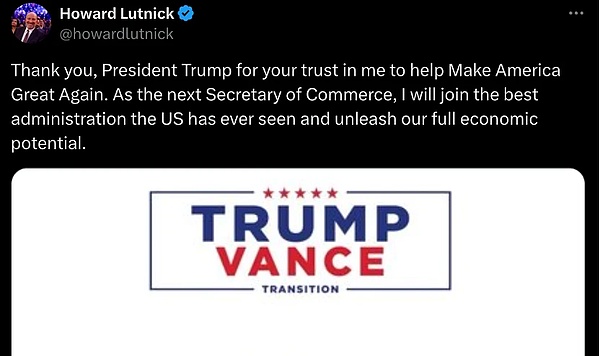
Lutnick's nomination has received support from multiple parties. Nominee for Health Secretary Robert F. Kennedy Jr. praised him on social media as "the strongest advocate for Bitcoin", while Musk also publicly supported Lutnick's appointment as Treasury Secretary.
However, if Lutnick officially takes office, he may adopt a tougher stance on China's trade policy. During the U.S. election, he publicly supported a 60% tariff on Chinese goods, which could become a key issue in future China-U.S. trade relations.
The appointment has not yet been announced.
04 Musk-led "Department of Government Efficiency"
In the executive order signed on the day of Trump's inauguration, there was one item that formally established the "Department of Government Efficiency", a cost-cutting plan co-led by Elon Musk and Vivek Ramaswamy. The full name of the Department of Government Efficiency is DOGE, and since the acronym DOGE is also associated with the cryptocurrency Dogecoin that Musk has long promoted, the related news has also become a weather vane for Dogecoin's development.
The executive order clearly defined the department's goals and structure, including upgrading government IT systems and promoting the application of DOGE (Dogecoin) in government payments and technology integration.
Musk's relationship with cryptocurrencies is well known, and partners who don't know can refer to previous articles: "Musk Will Change Twitter Logo to Dogecoin Emoji, What's His Intention?"
Ramaswamy is the founder of Strive Asset Management, which has important deployments in asset management and Bitcoin investment. According to a financial disclosure document from June 2023, Ramaswamy holds Bitcoin worth $100,000 to $250,000 and Ethereum worth $150,000 to $500,000. His personal investments reflect his high degree of trust in crypto assets.

According to previous plans, this department is not a formal federal government agency in the traditional sense, but will operate as an independent organization, providing policy advice to the White House and overseeing reform measures. The "Department of Government Efficiency" will focus on large-scale government spending cuts, streamlining the U.S. government's bureaucracy, and attempting to save costs by stripping away redundant departments and processes. As a tech giant, Musk will assist in driving the department's strategy and technological innovation, while Ramaswamy will take on a key leadership role.
However, according to Monday's executive order, DOGE will be housed within the executive branch, rather than operating as an external advisory board. The executive order also announced that the White House's existing "U.S. Digital Service" (focused on improving government websites and technology) will be renamed the "U.S. DOGE Service". The core mission of DOGE is to "implement the President's DOGE agenda, maximizing government efficiency and productivity through the modernization of federal technology and software."
Although the executive order did not specify the details of spending cuts and organizational restructuring, DOGE has been given the important responsibility of upgrading the federal IT system.
And according to related news, Musk and Trump's cooperation started much earlier, with Musk investing over $130 million to support Trump's campaign during the 2024 election.
Overall, the "Department of Government Efficiency" is an innovative policy initiative launched by Trump in collaboration with Musk and others, which is controversial but also highly watched. The department's operating model, specific goals, and the challenges it faces are worth continued attention.
05 White House AI and Cryptocurrency Affairs Coordinator
At the end of 2024, Trump also made a series of nominations for his Office of Science and Technology Policy (OSTP).
1) Stanford University AI Professor
Michael Kratsios was appointed as the Director of the White House Office of Science and Technology Policy. At the same time, he was also appointed as the incoming Trump administration's Presidential Science Advisor, to provide advice to "AI and Cryptocurrency Czar" David Sacks.
Kratsios is a research fellow at the Stanford University Institute for Human-Centered Artificial Intelligence (Stanford HAI). Prior to being appointed as the Director of the White House Office of Science and Technology Policy, he was a technology official in the first Trump administration, serving in the Department of Defense and the Department of Energy, and had significant influence over the Department of Defense's R&D budgets and projects, doubling federal AI and quantum research funding, and receiving the Department of Defense's Distinguished Public Service Award and Fortune's 40 Under 40 honor.
In addition, Kratsios also led the development of America's first national AI strategy and the world's first AI development regulatory principles, setting new benchmarks for technological innovation in the United States.
2) Cryptocurrency Czar
In early December 2024, David Sacks was nominated to serve as the President's Advisor on Artificial Intelligence and Cryptocurrencies, and to co-chair PCAST (the Presidential Council of Advisors on Science and Technology). This is a new position focused on crypto policy, the first of its kind in the White House. The creation of this new role underscores Trump's intent to drive rapid development in these two industries. Trump posted on his social media platform Truth Social, "In this critical role, Sacks will guide the government's policies on AI and cryptocurrencies, two areas vital to America's future competitiveness, and Sacks will work to make the U.S. the global leader in these fields."
It is worth noting that Sacks is a close friend of Musk and was an early executive at PayPal with Musk, and is one of the investors in Musk's $44 billion acquisition of Twitter. According to media reports, in April 2024, Musk and Sacks co-hosted a billionaire dinner with the theme "Against Biden".

As a seasoned tech entrepreneur, Sacks rose to prominence early on for his involvement in the development of PayPal, and is considered one of the early Silicon Valley founders. He also founded his own venture capital firm Craft Ventures, investing in well-known companies like Airbnb, Palantir, and Slack, and has also ventured into the crypto space, investing in crypto companies like BitGo and Bitwise.
Additionally, Sacks is the co-host of the popular podcast "All In", and has used the platform in recent years to express support for Trump, actively participating in discussions on tech-related economic policies. According to media reports, Sacks played a key role in helping Trump raise funds from tech industry donors, raising around $12 million for Trump's campaign team, demonstrating his significant influence in the crypto and tech sectors.
However, the specific details of his responsibilities have not yet been made public.
3) A16z's Corner
On December 22, 2024, U.S. President Donald Trump announced on the social media platform Truth Social that Scott Kupor, a founding employee and managing partner at a16z, has been appointed as the Director of the Office of Personnel Management (OPM), stating that he will "bring the much-needed reforms to our federal workforce."
Kupor will take full control of the OPM, responsible for coordinating recruitment and resource support, and will work closely with the "Department of Government Efficiency" (DOGE). He stated on social media X that he will make "efficiency" the core principle for the federal government, driving the modernization of government agencies.

According to Trump, Kupor was one of the founding team members of a16z, previously serving as the chairman of the National Venture Capital Association (NVCA), and playing a crucial role in a16z's growth. According to a16z's website, Kupor helped the firm grow its assets under management from $3 billion to over $40 billion. He is also the author of the bestselling book "Secrets of Sand Hill Road: Venture Capital and How to Get It". Sand Hill Road, located in Menlo Park, California, is known for its concentration of venture capital firms, and has provided founding capital to tech giants like Apple, Microsoft, and Amazon.
On December 23, 2024, Trump also announced that Sriram Krishnan, another a16z partner, has been nominated as the Senior AI Policy Advisor at the White House Office of Science and Technology Policy (OSTP).
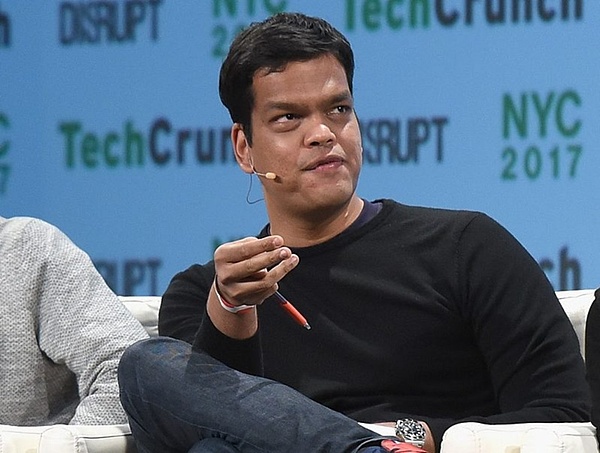
Krishnan is a seasoned tech industry leader, having held product and engineering leadership roles at X (formerly Twitter), Meta, and Snap, and has accumulated extensive experience at companies like Microsoft, Yahoo, and Facebook.
Trump stated that Krishnan will work closely with the President's Advisor on Artificial Intelligence and Cryptocurrencies, David Sacks, to ensure America's global leadership in the field of artificial intelligence.
Overall, these appointments demonstrate the current Trump administration's heightened focus on tech policy, far exceeding his previous term. In the previous term, the confirmation of the OSTP Director was delayed by over two years, while the current team is being put in place much more quickly.
Among these positions, except for Krasios's nomination, which requires Senate confirmation before taking full-time office, the other senior positions can immediately begin their work after the new government is sworn in on January 20th.
06 The IRS Commissioner Who Firmly Holds Bitcoin
The Internal Revenue Service (IRS) is responsible for collecting and managing federal tax revenue, ensuring the enforcement of tax laws. Regarding cryptocurrencies, the IRS may regulate the tax reporting of cryptocurrency transactions, requiring the reporting of crypto asset transactions, income, and investment gains, to ensure tax compliance.
On November 12, 2024, Trump announced the nomination of Fox News host and former military member Pete Hegseth as the Secretary of Defense. According to reports, Hegseth is a proponent of Bitcoin's decentralized value and has pledged not to sell his Bitcoin.
In December 2024, there were reports that the President-elect Trump hopes to eliminate all capital gains taxes on cryptocurrencies issued by U.S. companies. Upon this news, cryptocurrencies created by U.S. companies, such as ADA, ALGO, XRP, and HBAR, saw price increases. However, the timing of Hegseth's confirmation and whether these companies' profits will be fully tax-exempt remains to be seen.
07 The Crypto-Friendly Speaker of the House
On November 4, 2024, it was reported that Republican Congressman Mike Johnson, supported by Trump, successfully retained his seat as Speaker of the House. Johnson is considered crypto-friendly, as he previously voted in favor of the "21st Century Financial Innovation and Technology Act" (known as FIT21) and an anti-Central Bank Digital Currency (CBDC) bill, the former aimed at providing a regulatory framework for digital assets and related technologies, and the latter primarily to support decentralized financial innovation.
Industry media have reported that with Johnson's re-election, members of Congress who are friendly to cryptocurrencies are likely to push for cryptocurrency legislation in 2025. However, according to foreign media, Johnson's stance on cryptocurrencies is not entirely clear. Some reports suggest he may not prioritize crypto regulation.
Overall, Johnson's re-election could provide new momentum for cryptocurrency legislation, but its specific impact will depend on his and other congressional members' actions in the future policymaking process.
08 The Chair of the Digital Assets Subcommittee Who Proposed the "Bitcoin Bill"
On January 23rd, Senator Cynthia Lummis was appointed as the Chair of the Senate Banking Digital Assets Subcommittee.
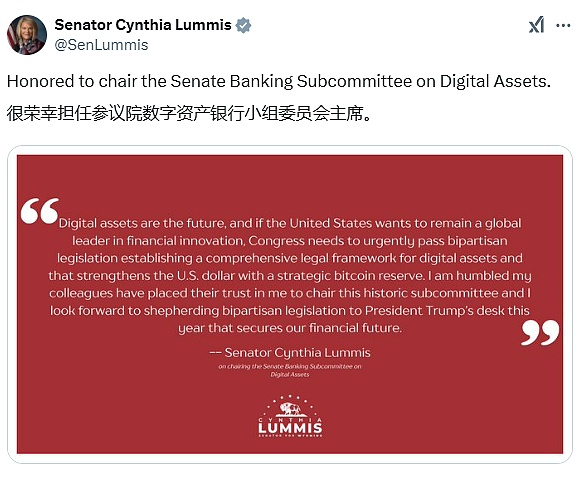
Lummis, a Republican senator, has attracted attention in the US political arena for her steadfast support for cryptocurrencies and her bold proposals. She is not only the first senator to publicly acknowledge owning Bitcoin, but has also been dubbed the "Crypto Queen" and "Bitcoin Senator" for proposing the "Promoting Innovation, Technology, and Competitiveness through National Optimization of Investment Act" (known as the "Bitcoin Bill"). Under her push, the disruptive technology of Bitcoin is moving from a private investment tool to a national strategic reserve.
As the first senator to publicly hold Bitcoin, Lummis' support for Bitcoin began with personal investment and gradually extended to policy proposals. She believes that Bitcoin is an effective tool for combating inflation and protecting personal financial freedom, and has even publicly called for "urgent passage" of Bitcoin strategic reserve legislation.
In July 2024, Lummis introduced the "Bitcoin Bill", proposing the establishment of a US strategic Bitcoin reserve to strengthen the US dollar and address inflation issues. The proposal aims to provide innovative solutions for the US financial system by purchasing and holding Bitcoin, and includes the following key measures:
1) Establish a secure Bitcoin reserve network
Operated by the US Treasury Department, a decentralized Bitcoin vault network to ensure the highest level of physical and network security for the nation's Bitcoin holdings.
2) Large-scale purchase of Bitcoin
Plan to purchase 1 million Bitcoins within five years, accounting for 5% of the total Bitcoin supply, comparable in scale to the US gold reserve, with a minimum holding period of 20 years.
3) Transparent funding source
Bitcoin purchases will be financed through existing funds from the Federal Reserve System and the Treasury Department, without additional fiscal burden.
4) Respect personal financial freedom
Explicitly support the self-custody rights of private Bitcoin holders, ensuring that the national strategic reserve does not infringe on individual property rights.
Previously, Lummis' proposal had sparked widespread discussion in Congress due to its forward-looking and controversial nature. Supporters believe that Bitcoin as a store of value can strengthen the US balance sheet and provide innovative solutions to the national debt problem. However, opponents have questioned the volatility of Bitcoin and its potential risks to national security.
Nevertheless, Lummis has not backed down, and she has now been successfully elected today, and should push the bill again. If this proposal is implemented, it may provide support for the future development of the cryptocurrency industry and have a profound impact on Bitcoin's market position.
09 Summary
It can be seen that after the election, Trump has been actively nominating crypto-friendly executives to key positions. Currently, Trump 2.0 seems to be on the path to fulfilling his pledge to make the US a "Crypto Capital" and a "Bitcoin Superpower".
However, Trump's extensive layout in the crypto field has also raised external questions about self-interest. According to market information, Trump's actions as a presidential candidate to launch a personal Memecoin and support crypto platforms (World Liberty Financial) are in conflict with his political responsibilities.
Experts also warn investors to be cautious, "although Trump's support may bring short-term benefits, whether it is beneficial to the long-term development of the cryptocurrency industry still needs to be observed in terms of the specific implementation of the policies."
Will the "Golden Age" of cryptocurrencies arrive as scheduled? We shall wait and see.





